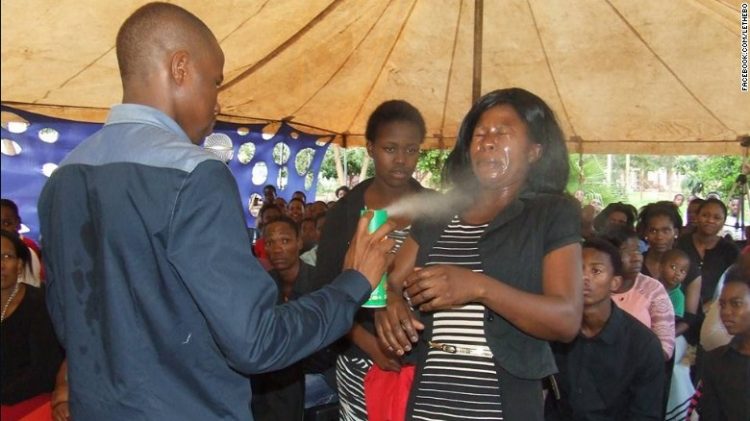South-African Teacher Uses Hip-Hop to Make Math Fun for Students

Kurt Minnaar, a 33-year-old math teacher at Cape Town’s Eben Dönges High School uses hip hop beats and rhymes to make math lessons more enjoyable for his students. Singing or listening to music during math class is usually frowned upon, but in Kurt Minnaar’s classroom, it’s actually a pre-requisite. The former choreographer and hip-hop artist is […]
South African Prophet Makes Congregates Drink Motor Oil to Cure Them

Prophet Bongani Maseko of the Breath of Christ Ministries, in Daveyton, South Africa, has come under fire recently for asking congregates to drink motor oil if they want to be “saved, healed and delivered.” Many of them actually took him up on the bizarre offer. Photos posted on the Facebook page of the Breath of Christ Ministries […]
South African Herbalist Walks Around Literally Dressed in Money

Michael Andile Dlamini, a successful herbalist from Nongoma, South Africa, has become known as Mzimb’okhalimali (a body dripping with money) after he started wearing a suit made of real banknotes, to show off his wealth. Dlamini started working as a healer three years ago, after finally listening to the voices of his ancestors. The 33-year-old claims that when […]
South-African Pastor Claims to Heal Congregates by Spraying Their Faces with Insect Repellent

Pastor Lethebo Rabalago of Mount Zion General Assembly, in Limpopo, South Africa, has recently been accused of endangering his congregates’ lives by spraying them with insect repellent, as a healing method. This bizarre practice first made news headlines in South Africa after photos showing Pastor Lethebo Rabalago spraying what looked like Doom bug spray in the faces […]
South African Restaurant Has Nunchuck-Wielding Karate Master Guarding Patrons’ Cars
Patrons dining at Lefty’s Restaurant, in Cape Town, South Africa, can relax and enjoy their meal knowing that their car is protected by a nunchuck-wielding karate master known only as Master Lolo. Car guards are quite popular in many South-African cities, charging drivers a fee to look over their vehicles and keep them safe from thieves […]
South African Artist Paints with Plastic Waste
Mbongeni Buthelezi, an artist from South Africa, has shunned paint in favor of plastic. He melts discarded plastic bags and uses the molten material to produce stunning works of art. The 49-year-old has been working with the unique medium for the past 23 years, ever since he graduated from art school. Buthelezi said he decided […]
African Pastor Turns Woman’s Hair into Delicious Food for His Congregation
A pastor from South Africa, who previously made headlines for praying for his congregation until they stripped, is now in the news again for turning a young woman’s hair into food and having his followers eat it straight from her head. Pictures posted on The End Times Disciples Ministries’ Facebook page show the pastor, Prophet Penuel […]
9-Year-Old Boy Marries Woman 53 Years His Senior, for the Second Time

Nine-year-old Saneie Masilela has managed to accomplish something that probably no other kid his age has ever done – he’s been married twice! And as if that wasn’t shocking enough, his bride is old enough to be his grandmother. Saneie has married 62-year-old Helen Shabangu twice in the span of one year. The second wedding […]
South African Homeless Man Refuses to Beg, Makes a Living by Selling Books on the Pavement

Philani Dladla, a homeless man living on the streets of Johannesburg, is probably the last person you’d expect to be a bookworm. Yet, the 24-year-old is quite a voracious reader. And instead of begging like other homeless people, he has chosen to make a living by reviewing and selling books. South African director and cinematographer […]
Izhikhothane – South Africa’s Bizarre Money-Burning Sub-Culture

Izikhothane, which loosely translates to ‘brag it’, is a South African subculture of youths who dress themselves in designer clothes they can barely afford. They arrive in minivans at public spots and participate in elaborate dance-offs against rival gangs. During these performances, they indulge in burning wads of cash, destroying their clothes and spilling expensive […]
You Can Win $1 Million Playing on the World’s Most Extreme Golf Course, But You’ll Need a Helicopter

The Legend Golf and Safari Resort is truly, well, legendary. The one-of-a-kind golf course is located in South Africa’s north-eastern Limpopo Province, nestled within the 22,000 hectare Entabeni Game Reserve. It is the longest par 72 golf course in the world, and of course safe from all the wildlife. It is also the only one […]
South African Pastor Tells Congregation to Eat Grass to Be Closer to God

Pastor Lesego Daniel, of Rabboni Centre Ministries, is a highly unusual person. In order to be closer to God, the South African preacher is encouraging his congregation to eat grass. He also tramples on them for added effect. The pastor is said to have claimed that humans can eat anything they choose to sustain themselves. When […]
Dancing with Death – The Train Surfers of Soweto

There’s no sea in Johannesburg so the poor young men from the inner city of Soweto get their kicks by surfing high-speed commuter trains. This dangerous pastime has claimed many lives throughout the years, but despite several initiatives to put a stop to it, train surfing remains pretty popular. South Africa is considered the birth […]
A Gap in Style – Front Teeth Removal Is Trendy among South African Youth

It’s rare for fashion trends to last as long as 60 years. But this one tradition has never gone out of style among generations of youth in Cape Town and other regions of South Africa – dental modification. It sounds odd, but the South African youngsters actually like to sport toothless smiles, after getting their […]
Sleazy Avatar-Themed Nightclub Opens in South Africa

Somehow I thought Avatar-themed nightclubs would be kind of cool, but recently opened Avastar (I know, right?) proves they can be sleazier than you ever imagined. Judging by the success of James Cameron’s Avatar movie, it was only a matter of time before someone used his fantasy world as nightclub theme. Only I think anyone […]
